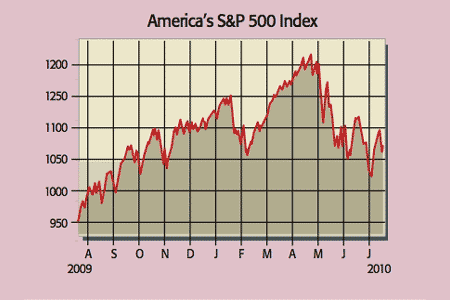
The major equity markets’ bounce off last month’s nine-month low has faltered of late. All eyes have been on America’s second-quarter earnings season, which got off to a solid start but has been overshadowed by grim macro-economic data. Analysts still mostly think that the world’s largest economy can avoid a double-dip recession. But then, as David Rosenberg of Gluskin Sheff points out, “these same double-dip deniers never saw the recession coming in 2007 in the first place”.
Industrial production barely rose month-on-month in June. Retail sales slid for a second successive month, the first back-to-back decline since early last year when the economy was in recession. And consumer sentiment in early July “shrank like a scoop of ice-cream in the Sahara”, as Alan Abelson puts it in Barron’s. The widely watched University of Michigan Index dropped almost ten points to 66.5 – an 11-month low and some way below its typical level in a recession.
Bank credit kept shrinking too. US consumer prices fell for a third month in a row. Mortgage applications for new home purchases declined to a 14-year low. The growth rate of the ECRI Leading Index has slid to -9.8%. In the past, a figure of -10 or less has always signalled recession and the Federal Reserve is “getting antsy”, says Abelson. The minutes of its latest meeting trimmed growth forecasts and said “the risk to the outlook had shifted to the downside”. In sum, as the stimulus wears off, “the US economy appears headed into a second leg of an unusually challenging downturn”, says John Hussman of Hussman Funds.
A potentially deflationary recession is likely to be unusually challenging for investors, who have yet to price in slowing earnings growth let alone a recession, says Simon Thompson in Investors Chronicle. He notes that the S&P is hardly cheap on 16 times trailing earnings. The consensus expects overall S&P 500 earnings to jump by a “punchy” 66% from 2009 to 2011.
That means profits need to gain 44% over the next seven quarters – hardly realistic in a downturn. With US stocks primed for disappointment, the jitters will affect us too – Wall Street tends to lead other markets especially when things turn ugly. If a US recession does begin to seem increasingly likely, “there will be no hiding place for investors”.